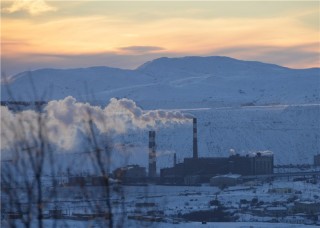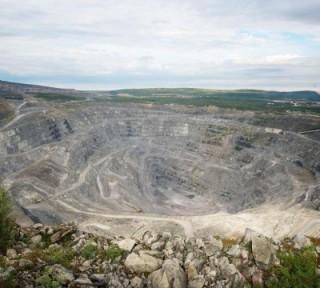
Joint letter – ICC reform and expansion risks diverting ETS Revenues from real climate action
In light of the European Commission’s ongoing considerations to amend the ETS State Aid Guidelines, revising the rules for Indirec...
News

Publish date: January 26, 2015
News
MURMANSK – As last year drew to a close, the Murmansk Region’s Ministry of Ecology Natural Resources promised to support an initiative by environmentalists calling on regional polluters to slash harmful emissions for just a few days. Of 17 heavy industries, only three bothered to answer the appeal.
And of those, all refused to take part in short term pollution abatement efforts, and instead confined their efforts to holding seminars and lectures on the environment.
In December 2013 Bellona Murmansk, with other area environmental NGOs, sent an appeal to the Murmansk Region’s governor, Marina Kovtun requesting she support an initiative called “Zero Negative Impact on the Environment,” geared toward asking industrial polluters to voluntarily throttle back their harmful emissions temporarily.
Kovtun greeted the proposal as a show of morale to be adopted in support of the

annual International Pollution Control Day on December 2, which numerous countries observe.
December is no arbitrary choice for the campaign: the month typically sees meteorological conditions that facilitate spiking pollution rates around Murmansk.
The date of International Pollution Control Day was further conceived as a way to mark the anniversary of the disaster in Bhopal, India where a Union Carbide pesticide factory sprung a leak in 1984, killing more than 2,500 people and exposing a half a million more to lethal methyl isocynanate gas and other chemicals.
On Kovtun’s nod, Murmansk’s Ministry of Ecology and Natural Resources in 2014 sent out a suggestion to the region’s heavy-duty industry’s to take part in the Zero Negative Impact on the Environment initiative, asking them to briefly halt emissions causing a negative impact on the environment, or to arrange environmental events of their own.
Better luck next time?
Among the 17 heavy polluters to which the Ministry sent the suggestion to voluntarily reel in pollution were the Kola Mining and Metallurgy Combine, the mining enterprise Apatit, the Kovdorskiy Mining and Enrichment facility, the Olenogorsk Mining and Enrichment company (in Russian), The North-west Phosphorous Company, the 10 Ship Repair Yard (in Russian), the Kandalashka Experimental Mechanical Engineering Company (in Russian), and others.

The invitation garnered a mere three responses, one from the Apatit Mining Enterprise, another from Olenogorsk Mining and Enrichment Company, and a third from the Kola Nuclear Power plant. All three refused to lower pollution output.
For its part, Apatit listed a number of reasons it couldn’t downshift production, and hence polluting emissions, even for a short time. Instead, it took part in the campaign by hosting a seminar called “A Day of Ecological Significance” for 100 students at local high schools.
Company representatives told the kids about rational resource usage, and how to protect the environment while engaged in heavy-duty mining and mineral enrichment.
For its part, the Olenogorsk Mining and Enrichment Company held a December 2 lecture on ecology for its employees. A company specialist told them about the facility’s affect on the environment and what, efforts the company was undertaking to minimize them.
Bellona was unable to determine what educational efforts the Kola Nuclear Power Plant undertook.
Lukewarm efforts earn high praise
Despite this tepid showing, Elvira Makarova, head of the ecology and resource usages department of the Ministry of Natural Resources and Ecology, called the campaign a success.
“The Murmansk Region has many environmental problems [and] such a campaign is needed to again draw the attention of resource users to existing problems,” she told Bellona in an interview. “In 2013, there were no participants at all, but in 2014 we’ve already seen three companies sign up – it’s not bad that this year they conducted lectures, because ecological education is very important. First we foster an ecological consciousness, and then that will lead to reduced emissions.”
Andrei Zolotkov, director of Bellona Murmansk said the campaign barely registered on the radar.
“Bellona thanks the Ministry for its support of the campaign, but from my point of view it passed this year unnoticed,” he said. “But taking into account the annual character of the event, we are really expecting that in 2015, industry will a little more responsibly participate, and not only by means of educational talks and seminars.”
Environment needs better PR representation
Makarova’s urged that the Zero Negative Impact campaign be more widely advertised such that it might gain traction in other Russian regions, as well as internationally, adding that her ministry “fully supports the environmentalists’ initiative and will definitely continue to support the campaign in the future.”
Zolotkov agreed, saying a campaign similar to Zero Negative Impact should be carried out worldwide on the internationally recognized World Environment Day on June 5.
“On the eve of this day, the Russian Ministry of Natural Resources could appeal to industry to reduce its harmful impacts on the environment,” said Zolotkov. “And why can’t we in Murmansk initiate a winter campaign? Everything begins with small steps, and if Murmansk’s Ministry of Natural Resources can this year continue the campaign and suggest it to our colleagues in Karelia and the Arkhangelsk Regions that they participate, then we could widen the campaign’s geography.”

In light of the European Commission’s ongoing considerations to amend the ETS State Aid Guidelines, revising the rules for Indirec...

The 5th Industrial Carbon Management (ICM) Forum took place this year on 8-9 December in Athens, Greece, co-hosted by the European Commission an...

Today, the European Commission published a series of Carbon Border Adjustment Mechanism(CBAM)-related documents including two legislative proposals a...

Today, the European Commission published its European Grids Package, presented as an upgrade of the EU’s energy infrastructure to lower bills and boo...

The European Commission is set to publish the the Grids Package on December 10th, the different legislative proposals and secondary legislations rela...
Get our latest news